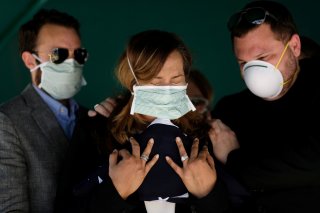Foreign Aid is Critical to Stopping the Coronavirus
This early evidence demonstrates how a connected global response is critical. Until there is a vaccine or effective treatment that everyone can access, the world will face the potential of continual or repeated coronavirus outbreaks.
While attention in the United States has rightly been focused on responding to the coronavirus outbreak at home, too little focus has been devoted to helping contain the pandemic beyond U.S. shores. Given the global spread of this disease, and the likelihood of repeated waves, containing the coronavirus everywhere will be essential to combat this disease. In order to effectively protect Americans at home, the United States must provide robust foreign assistance to help the world fight the pandemic.
The Trump administration does not seem to have grasped the global nature of this disease. President Donald Trump spent months downplaying the gravity of the situation—calling it a “hoax” that would “disappear”—and wasted critical time as he left America dangerously unprepared as the world watched the disease spread like wildfire. Now that COVID-19 has killed more people in America than in any other country, Trump claims he will be temporarily shutting down all immigration to the United States. Neither ignoring the problem overseas nor shutting down borders will ensure the safety of the American people.
If America wants to tackle coronavirus, then it needs a plan to help every country defeat the outbreak. With 211 countries and territories currently being affected according to some trackers, the coronavirus outbreak is truly a global crisis. Although precise predictions are challenging, scientific experts have warned that even if some countries manage to contain the current outbreak, we could inevitably see “independent self-sustaining outbreaks” and “wintertime outbreaks . . . after an initial pandemic wave.” As more citizens continued to return from abroad, some countries in Asia, initially praised for their coronavirus response, saw a second coronavirus wave with new cases that required even stricter measures. The head of the World Health Organization said on April 20, “the worst is still ahead of us.”
This early evidence demonstrates how a connected global response is critical. Until there is a vaccine or effective treatment that everyone can access, the world will face the potential of continual or repeated coronavirus outbreaks. Countries with developing economies or weak healthcare infrastructure—including those in refugee and displaced persons camps—will be particularly at risk for outbreaks and lack the capacity to take the required measures to stop its spread.
Therefore, the only way to protect Americans requires protecting others around the world. That requires not just diplomatic leadership from the United States, but real assistance to international organizations and developing countries that need the help.
The need abroad is great, and so far, the Trump administration has not provided enough foreign aid. Worse still, Trump’s decision to defund the World Health Organization (WHO), the body in charge of global health, will hamper the international response and discourages cooperation at exactly the moment that its work is needed more than ever.
If the Trump administration wants to truly tackle the coronavirus, then it will need to think globally for solutions.
First, of course, America needs to get its act together at home. The Trump administration should adopt a coherent, evidence-based plan to end the coronavirus crisis—as the Center for American Progress has outlined. Developing the necessary health infrastructure in the United States can then allow for a gradual reopening of the economy.
Second, the United States must support international and regional efforts to defeat the coronavirus. This should include significantly increasing funding to UN agencies like UNHCR and UNICEF and restoring full funding and boost support to the WHO. The United States should also leverage its influence as a leading donor to international financial institutions, like the World Bank, Inter-American Development Bank, and the African Development Bank, to push for fast action and policy responses for economies most at risk, including debt relief.
Third, the United States can help build health-care capacity in partner countries that will suffer from the coronavirus outbreak. The Trump administration should increase funding to regional efforts that already work to bolster health infrastructure, and use existing U.S. assistance programs like PEPFAR-funded labs and clinics to help countries deal with COVID-19. The United States can also boost bilateral U.S. programs through USAID, like the Emerging Pandemic Threats 2 Program—significant new funds would help train officials and health experts on how to handle the pandemic, which will be critical to ultimately containing the outbreak.
Fourth, the Trump administration must change its policies to ensure that it is doing no harm. U.S. sanctions on Iran, Venezuela, and North Korea are hampering the coronavirus response by making it harder for aid to get through. Despite recent guidance clarifying exemptions for legitimate aid, difficulties will likely persist. The Trump administration should suspend or lift specific sanctions for cases where the United States may be inadvertently hindering the response.
Finally, the United States must be proactive in planning for the future. Experts agree that the developing and distributing a vaccine—to everyone who needs one around the world—will be crucial to ending this pandemic. The U.S. government can work with allies and partners to reach a common agreement about the need to cooperate on vaccine development and production and can help fund vaccine production facilities in advance so that we can manufacture a cure once it has been developed.
A global crisis requires a global solution. To ensure that America deals with the coronavirus crisis in a sustainable way, the United States must step up its effort to help everyone fight this pandemic.
Michael H. Fuchs is a senior fellow at the Center for American Progress, focusing on U.S. foreign policy priorities and U.S. policy toward the Asia-Pacific region. Alexandra Schmitt is a policy analyst for human rights, democracy, and development on the National Security and International Policy team at CAP. Haneul Lee is a research assistant for Asia Policy with the National Security and International Policy team at CAP.

